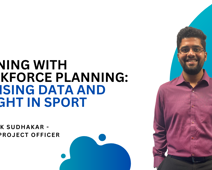In the world of sport, and physical activity research and insight can be transformative when done well. But all too often, I’ve seen research fall into the trap of asking what’s easy or “nice to know,” rather than what’s necessary to truly drive action.
What I’ve learned through working in this space is simple, but not always easy: good research starts with integrity, ethics, and intent. It’s about more than ticking boxes or capturing data for the sake of it. It’s about asking the right questions—the ones that matter.
From Data to Change
Strong methodologies aren’t an academic luxury—they're a practical necessity. You need both qualitative and quantitative approaches. Numbers tell us one part of the story, but lived experiences, voices, and emotions fill in the context. The real magic happens in triangulation—when we bring data sets together and ask: Do they align? Do they speak to one another? And if not, why not?
That tension can be where the most valuable insight lives.
Avoiding the ‘So What?’ Trap
I’ve sat in plenty of meetings where research findings are shared and heads nod… but nothing changes. Why? Because we didn’t ask: So what? What does this mean for practice, for policy, for the people we’re here to serve?
The story is useful, but only when it leads somewhere.
Better Questions, Better Sport;
Bad research doesn’t always come from bad intentions. It comes from not being brave enough to ask what we really need to know. It stems from designing studies that are easy to deliver but difficult to act upon. It stems from focusing on what's already known, rather than leaning into what makes us uncomfortable.
Good research in sport is bold. It digs into gaps. It listens deeply. And most importantly, it leads to change.
Whether we’re assessing culture, improving welfare, or tracking participation, insight must be more than informative. It must be actionable. Otherwise, why are we doing it?



